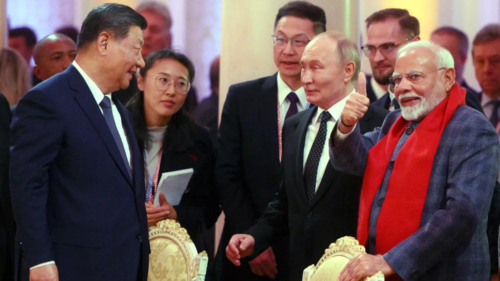Diplomatic tensions between the United States and India have escalated sharply following Washington’s imposition of a 50% tariff on Indian exports. The move, justified by the White House as a response to India’s continued imports of discounted Russian crude oil, has triggered both economic shockwaves and political backlash — and now appears to be drawing in European allies.
According to reports from India Today and Big News Network, U.S. officials have been lobbying European Union member states to impose similar punitive measures on India. These requests reportedly include tariffs on Indian exports and potential restrictions on oil and gas imports from India — actions aimed at pressuring New Delhi to curtail its energy ties with Moscow.
The U.S. is likely frustrated by the growing closeness between Modi, Putin, and Xi. It sees this as:
A threat to Western sanctions and unity, a diplomatic setback in its Indo-Pacific ambitions, and a signal that India may be leaning toward a multipolar world order that challenges U.S. dominance. That frustration is now manifesting in tariffs, diplomatic pressure on allies (like the EU), and sharper rhetoric aimed at India’s geopolitical choices.
Tariffs Targeting Russian Oil Trade
The tariffs on India by the US, which took effect in August 2025, represent one of the most aggressive trade actions Washington has taken against a non-adversarial country in recent years. U.S. Trade Adviser Peter Navarro accused India of indirectly supporting Russia’s war in Ukraine by purchasing discounted crude oil and re-exporting refined products at a profit.
In total, Washington levied a 50% tariff on a wide array of Indian goods — particularly in sectors like textiles, automotive components, and gems and jewelry — hitting some of India’s largest export industries.
India Denies Allegations, Slams “Double Standards”
India has strongly refuted the accusations, with Oil Minister Hardeep Singh Puri denying that India is profiteering from Russian oil imports. Speaking at a press conference, Puri stated, “Our energy purchases are transparent and driven by national interest. These tariffs are unfair, unjustified, and reflect a double standard.”
New Delhi has criticized the West’s selective approach to sanctions enforcement, pointing out that both the U.S. and EU continue to import critical commodities from Russia — including uranium, fertilizers, liquefied natural gas (LNG), and chemical products.
“While preaching sanctions to others, many Western countries are still doing business with Russia. This hypocrisy undermines the credibility of the international rules-based order,” said a spokesperson from India’s Ministry of External Affairs.
What Would EU Sanctions on India Mean for Europe?
Should the EU decide to join the U.S. in sanctioning India, it would risk significant economic, diplomatic, and strategic consequences.
1. Economic Backlash and Trade Disruption
India is currently the EU’s 10th largest trading partner, and trade volumes have been growing steadily. European companies in sectors like pharmaceuticals, machinery, green tech, automotive, and luxury goods depend heavily on access to the Indian market.
Retaliatory tariffs from India — which would be likely in the event of EU sanctions — could affect billions of euros in European exports. Additionally, ongoing EU-India free trade agreement (FTA) negotiations would almost certainly collapse, ending years of diplomatic efforts to deepen economic ties.
2. Energy Diversification Setback
While the EU does not import large volumes of oil or gas directly from India, the country plays a growing role in global fuel refining and re-export, including to European destinations. Sanctions on Indian energy exports could further strain already volatile fuel markets, especially if India responds by limiting refined product flows to Europe.
3. Strategic Alienation of a Key Indo-Pacific Partner
Perhaps most critically, alienating India could weaken the EU’s broader Indo-Pacific strategy, which aims to build alliances with regional powers to balance China’s influence. Sanctioning India could push New Delhi closer to Russia and China — as already evidenced by Prime Minister Modi’s recent meetings with Xi Jinping and Vladimir Putin at the SCO summit.
Such a shift would undercut European geopolitical interests, especially at a time when Brussels is seeking to reduce dependence on both Washington and Beijing.
4. Public and Political Division Within the EU
Given differing national interests across the EU, any coordinated move against India could lead to internal disunity within the bloc. Countries with strong economic ties to India — such as Germany, France, and the Netherlands — may be reluctant to antagonize a major emerging economy over a U.S.-led policy push.
European Reaction: Silence So Far
So far, European officials have not publicly responded to Washington’s calls for coordinated sanctions. While some EU countries have expressed concerns over India’s energy ties with Russia, there has been no official indication of a unified European stance.
Analysts believe the EU is reluctant to jeopardize its growing trade relationship with India, especially as both sides continue to negotiate a long-stalled Free Trade Agreement (FTA). Additionally, with the European energy crisis still fresh, many member states are cautious about interfering in global energy markets.
Amid mounting pressure from the West, Indian Prime Minister Narendra Modi recently visited China for the Shanghai Cooperation Organisation (SCO) summit, where he held talks with Russian President Vladimir Putin and Chinese President Xi Jinping. It marked Modi’s first trip to China in seven years — signaling a potential shift in India’s foreign policy posture.
Experts see the visit as part of a broader strategy by India to deepen cooperation with non-Western powers, both to secure energy supplies and to counterbalance Western diplomatic leverage.
The growing rift between India and the West over Russian oil trade is fast becoming a global fault line. As the U.S. intensifies its trade war against New Delhi and calls on its allies to follow suit, the European Union faces a difficult choice: align with Washington at the risk of alienating a vital strategic partner, or prioritize its long-term interests in the Indo-Pacific.
For now, Brussels appears to be choosing caution — but the geopolitical consequences of this standoff may be felt far beyond trade balances.
